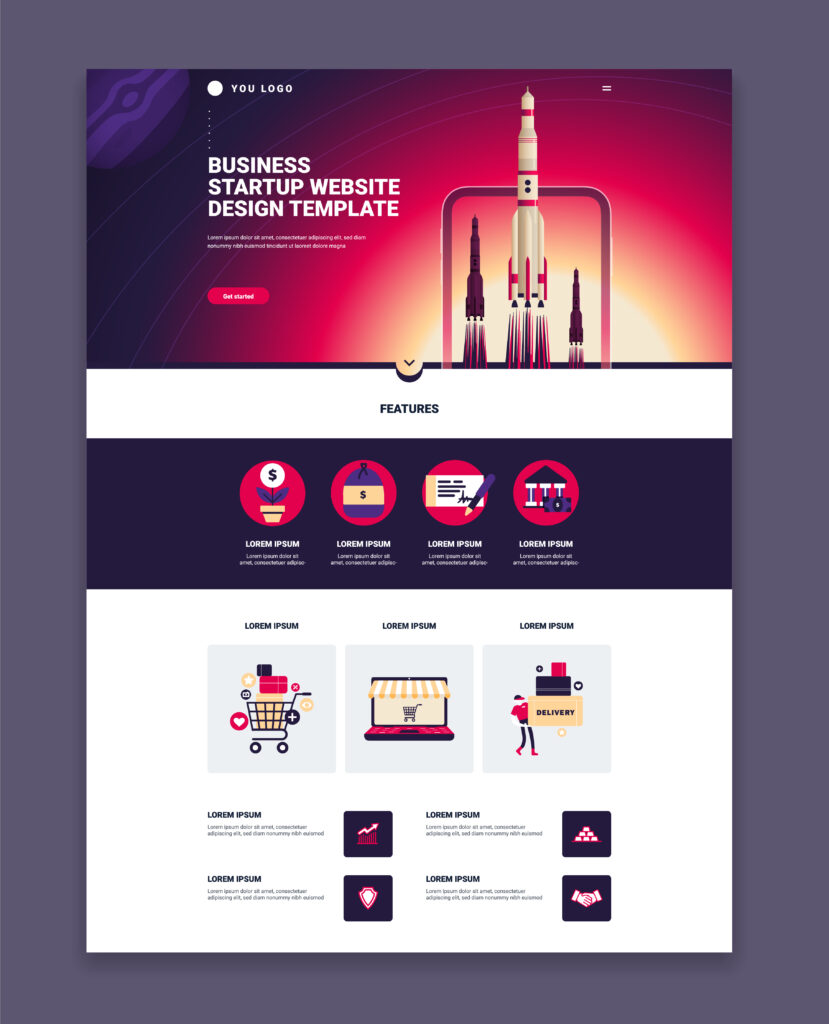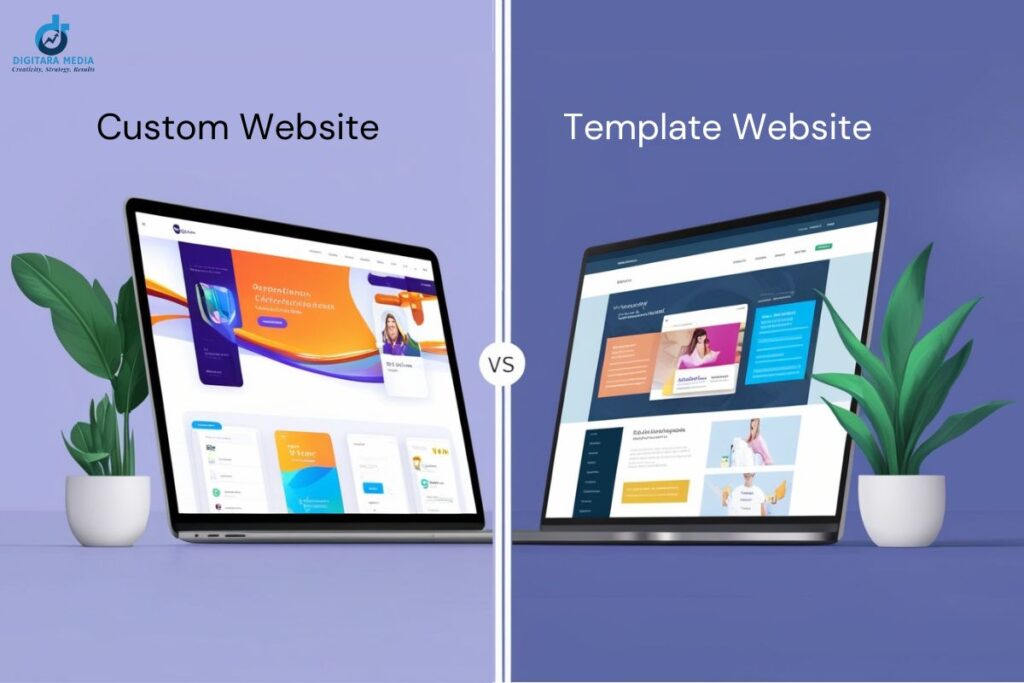In today’s digital world, having a website is non-negotiable for any business. Whether you’re a small startup or a well-established brand, an online presence is key to reaching more customers and growing your business. But when it comes to building a website, the big question arises: Should you go for a custom-built website or use a template-based solution?
Choosing the right option depends on various factors, including budget, customization needs, scalability, and long-term goals. In this article, we’ll dive deep into the differences, pros, and cons of custom vs. template websites to help you make an informed decision for your business.
Understanding Custom Websites
A custom website is built from scratch, specifically tailored to meet your business’s unique needs and branding. Unlike template websites, which rely on pre-made designs, custom websites allow for complete control over design, functionality, and user experience.
Key Characteristics of Custom Websites:
- Designed uniquely for a brand
- Built using coding languages like HTML, CSS, JavaScript, PHP, Python
- Hosted on private servers or customized hosting solutions
- Offers unlimited flexibility and scalability
How Custom Websites Are Built:
- Planning & Strategy: Business needs, target audience, and design goals are defined.
- Design Phase: UI/UX designers create wireframes and visual layouts.
- Development: Frontend and backend coding bring the design to life.
- Testing & Launch: The website is tested for performance, security, and SEO before going live.
Custom websites offer endless possibilities in terms of design and functionality, making them an excellent choice for businesses looking for a unique online presence.

Understanding Template Websites
A template website is built using pre-designed layouts that can be customized with text, images, and branding elements. These websites are usually created with website builders like:
- WordPress (with pre-made themes)
- Wix (drag-and-drop builder)
- Squarespace (all-in-one website solution)
- Shopify (eCommerce-friendly templates)
Key Characteristics of Template Websites:
- Uses pre-made themes or layouts
- Quick and easy to set up
- Limited customization options
- Often includes drag-and-drop builders
How Template Websites Are Created:
- Choose a template/theme that fits your business type.
- Customize the colors, fonts, and branding elements.
- Add content, such as text, images, and videos.
- Connect necessary plugins or integrations.
- Publish the website with a domain name and hosting provider.
Template websites are ideal for small businesses, startups, and individuals who need a simple online presence without the hassle of coding or design complexities.
Advantages of Custom Websites
A custom website comes with several benefits, making it a strong choice for businesses that want full control over their online presence.
1. Unique Design Tailored to Your Brand
Unlike template websites, where multiple businesses may use the same design, custom websites ensure a one-of-a-kind look that represents your brand’s identity.
2. Greater Flexibility & Scalability
With a custom website, you can add custom features, APIs, and functionalities without limitations, making it easy to scale as your business grows.
3. Enhanced Performance & Optimization
Custom websites are built with optimized code, ensuring faster load times, improved performance, and a better user experience.
4. Better Security & Custom Features
Because they are built from scratch, custom websites can incorporate advanced security protocols, reducing the risk of cyber threats and hacks.
5. SEO-Friendly Development
Custom websites allow developers to implement clean code and SEO best practices, improving your site’s chances of ranking higher on search engines like Google.
Disadvantages of Custom Websites
Despite their many benefits, custom websites also have some drawbacks:
1. Higher Development Costs
Building a custom website requires a team of developers, designers, and SEO experts, which can be expensive compared to using a template.
2. Longer Development Time
A custom website can take weeks or even months to build, whereas a template website can be launched in a few days.
3. Requires Technical Expertise for Maintenance
Unlike templates that come with automatic updates, custom websites require ongoing maintenance, which may require hiring a developer.
Advantages of Template Websites
Template websites are a popular choice for businesses looking for a quick, budget-friendly online presence. Here are some of the main benefits:
1. Cost-Effective Solution
One of the biggest advantages of template websites is affordability. Since they use pre-designed layouts, they eliminate the need for custom development, saving businesses thousands of dollars in web development costs.
2. Quick and Easy Setup
Unlike custom websites that take weeks or months to build, a template website can be set up in a few hours or days. Businesses that need an online presence fast can benefit greatly from this option.
3. Beginner-Friendly with Drag-and-Drop Builders
Most website builders, such as Wix, Squarespace, and WordPress, offer drag-and-drop functionality, making it easy for anyone—even those without coding knowledge—to create a functional website.
4. Pre-Optimized for Mobile Responsiveness
Many modern templates come mobile-friendly by default, ensuring that your website looks good on all devices without additional coding or design work.
Disadvantages of Template Websites
While template websites are convenient, they come with some significant downsides that can affect business growth in the long run.
1. Limited Customization Options
Template websites restrict how much you can modify their design and functionality. This means businesses may struggle to make their site truly unique or add advanced features.
2. Generic Design, Not Unique to a Brand
Many businesses use the same popular templates, leading to websites that look similar. This can make it hard to stand out from competitors.
3. Performance and Loading Speed Issues
Many website templates include unnecessary code and plugins, which can slow down loading speeds, negatively impacting user experience and SEO rankings.
4. Security Risks with Third-Party Plugins and Themes
Template websites often rely on third-party plugins to add functionality. If these plugins are not regularly updated, they can introduce security vulnerabilities that put your website at risk of cyberattacks.
Cost Comparison: Custom vs. Template Websites
The cost of building a website varies depending on whether you choose a custom or template-based approach.
| Feature | Custom Website ($) | Template Website ($) |
| Initial Development | $5,000 – $50,000+ | $0 – $500 |
| Hosting & Domain | $100 – $500/year | $50 – $200/year |
| Maintenance | $500 – $5,000/year | $0 – $500/year |
| Total Cost (First Year) | $5,600 – $55,500+ | $50 – $1,200 |
While template websites have a lower upfront cost, custom websites offer long-term value with better branding, performance, and scalability.
SEO Capabilities: Which One is Better?
Search Engine Optimization (SEO) is crucial for ranking higher on Google. Here’s how both options compare:
Custom Websites & SEO
✅ Clean and optimized code for better indexing
✅ Advanced control over meta tags, URLs, and schema markup
✅ Faster loading speeds improve ranking
✅ No reliance on third-party plugins that may slow down performance
Template Websites & SEO
❌ Many templates include bloated code, affecting speed
❌ Limited ability to optimize URL structure and metadata
❌ Reliance on plugins for SEO features
❌ Poor mobile performance on some templates
If SEO is a priority, a custom website is the better option for long-term growth and higher rankings.
Performance and Speed Comparison
Website speed is critical for user experience and SEO.
Custom Websites & Speed
- ✅ Built with optimized code for fast performance
- ✅ Uses lightweight frameworks and custom-built features
- ✅ No unnecessary plugins slowing down the site
Template Websites & Speed
- ❌ Bloated code can lead to slow loading times
- ❌ Shared hosting on platforms like Wix and Squarespace may reduce performance
- ❌ Heavy reliance on third-party plugins can slow down the site
For better performance, a custom website is the superior choice.
Security Aspects: Custom vs. Template Websites
Security should be a priority for every business. Here’s how both options compare:
Custom Website Security
✅ Built with custom security measures
✅ Can include firewalls, SSL, and encryption
✅ No reliance on vulnerable third-party plugins
Template Website Security
❌ Dependent on platform security (e.g., WordPress, Wix)
❌ Risk of outdated plugins leading to security breaches
❌ Higher chance of malware and hacking attempts
For businesses handling sensitive customer data, a custom website provides better security.
Customization and User Experience
User experience (UX) is key to customer satisfaction and conversions.
Custom Website UX
✅ Tailored to specific business needs
✅ Fully customizable for better navigation and design
✅ Enhanced features for higher engagement
Template Website UX
❌ Limited customization affects branding and functionality
❌ Some templates are not optimized for accessibility
❌ Risk of using outdated or overused designs
For a unique and user-friendly experience, a custom website is the better option.
Scalability and Future Growth
Your website should grow as your business expands.
Custom Website Scalability
✅ Easily upgraded with new features
✅ Can handle increased traffic without issues
✅ Designed for long-term growth
Template Website Scalability
❌ Limited ability to add advanced features
❌ Performance issues with high traffic
❌ Often requires a complete redesign to scale
A custom website is the best choice for businesses planning for future growth.
Who Should Choose a Custom Website?
A custom website is best for:
✅ Established businesses looking for a unique brand presence
✅ Companies that need advanced features and scalability
✅ Businesses that prioritize SEO, security, and performance
Examples:
- E-commerce stores with custom checkout systems
- Large enterprises needing custom integrations
- High-traffic websites requiring fast, scalable performance
Who Should Choose a Template Website?
A template website is best for:
✅ Startups and small businesses on a budget
✅ Individuals needing a simple, quick online presence
✅ Businesses that don’t require custom features
Examples:
- Small local businesses (restaurants, salons, freelancers)
- Personal portfolios
- Event-based websites
Conclusion
When deciding between a custom website and a template website, consider your:
- Budget (Custom websites are more expensive)
- Timeframe (Templates are faster to launch)
- Long-term goals (Custom websites are better for growth)
If you need a fast, budget-friendly solution, go with a template website.
If you want a unique, scalable, and high-performing website, invest in a custom website.
FAQs
Can I Start With a Template Website and Later Switch to a Custom Website?
Yes! Many businesses begin with a template and upgrade to a custom site as they grow.
How Much Does a Custom Website Typically Cost?
A basic custom website can cost $5,000+, while advanced websites can go beyond $50,000.
Are Template Websites Bad for SEO?
Not necessarily, but they have limitations that can impact long-term SEO success.
How Long Does It Take to Build a Custom Website?
Anywhere from 4 weeks to 6 months, depending on complexity.
Which Option is Better for eCommerce Businesses?
A custom website is ideal for larger eCommerce stores, while a template works for small shops.

